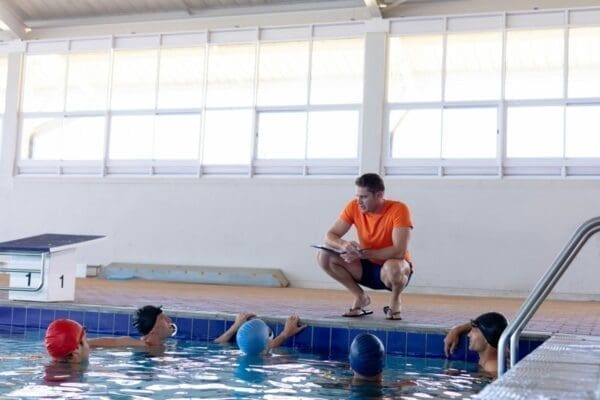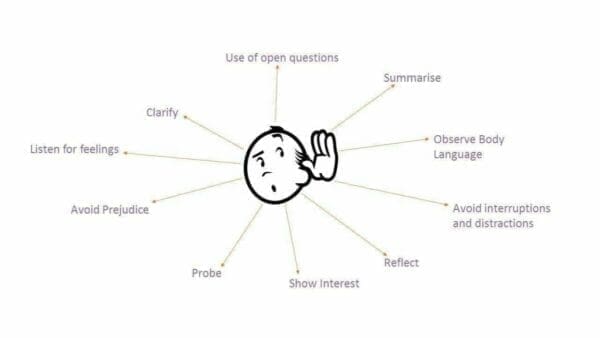The Art of Communication is Simply That, an Art.
There are nuances, specific approaches and carefully made choices in the art of communication. Like painting, only not everyone paints. Painting is an art, but those who paint do it because they know how. Those that do not paint, it is likely because they do not know how.
The difference is that everyone must communicate, whether they have mastered the art or not. This means that these nuances, specific approaches and choices are all still made. They are simply made by an uninformed brain. So, tell me, if you were forced to paint every day, do you think you would go to some effort to know what you were doing?
Well, I would and it is the same in communication. We all have to do it every day in multiple capacities and yet so many of us do not go to any effort to understand how to do it better. The solution? This article. Read on!
Something everyone needs to know before seeking more in their communication skills is this: the art of communication cannot be mastered by anyone without mastering their listening skills first. This is the most important lesson I shall write about here – listening is communication. The key is listening in order to understand, rather than listening in order to simply respond. A key difference is highlighted there – arguably the most important distinction in all of communication.
What are the Two Types of Communication?
Well, there are many types of communication if we are talking face to face, social media and phone calls. These all come with their own challenges, of course. Firstly, however, we must look at communication from a macro perspective.
Verbal and Non-verbal. That’s it. Speaking with your mouth and speaking with everything else. Both are as powerful as each other.
Verbal Communication
Verbal communication is the one we are much more conscious of, the one we actively engage in and understand. There is power in your words because of this. We very much think about the words we use and the way we say them – even if it is just for a brief moment. This is the main difference between these two communication types – verbal happens consciously.

The way in which we output information and ideas in a conscious manner. The way we receive and process information and ideas in a conscious manner. These are the speaking and listening sides of the coin in verbal communication. We output words, they are received, and then input words which are processed. A simple conversation.
Non-Verbal Communication
Non-verbal communication is what happens when you strip away the exact words that are being used. All you are left with at this point is the way in which these words are said – the power lies right here. Let me give you an example: ‘I thought she had fired him.’ Say this sentence six times and emphasize a different word each time you say it. Each time, you are saying exactly the same words but, actually, what you are saying completely changes with each specific emphasis. This is the importance of non-verbal communication.
Everything you are saying is processed by the other person consciously, understanding each of the words that form your sentences and what this then means. The way in which you are saying everything is processed subconsciously, understanding things like tone, emphasis, body language and facial expressions to determine what it is you actually mean by the words you have said. This is what changes ‘I thought she had fired him’ to ‘I thought she had fired him.’ Same words, two very different meanings.
What are the Benefits of Improving the Art of Communication?
There are plenty of benefits to improving your communication skills, in fact, there is no downside.
1. Better Conversations
Whilst there are plenty of benefits in the workplace – dealing with conflict or difficult situations with good communication – this benefit is purely personal. The ability to communicate better simply means your conversations get better. Being able to articulate exactly what you are wanting to say means that you can have better faith in the fact that what you are explaining is actually getting across.
Whilst you are also listening more attentively, in order to understand, you can build better responses with genuine thought behind them. You’ll command more respect naturally by being more thoughtful about what you are saying and how you are saying it.
2. You’ll Be a Better Coach

Teachers and coaches with great communication skills will always get higher achieving apprentices. Being able to explain things more clearly and even adapt this explanation and tailor it to specific people with the knowledge of how they best learn is an invaluable skill. It makes people want to learn from you because they know they can understand exactly what you need from them. Being a better communicator will always heighten your leadership and coaching skills. People look to the clearest and most cohesive voice for direction – let that be yours.
3. Better Idea Articulation
I find myself, all the time, in a place of trying to explain an idea that is so clear in my head and not having exactly the right words to articulate it. ‘So it’s Mad Max meets Black Mirror but with like a futuristic twist and a little bit of pazazz.’… Yes, this is genuinely an idea I attempted to lay out for a friend. Safe to say, he didn’t understand a damn word I’d said. In fact, I ended my piece by saying ‘understand?’, to which he responded: ‘I understand each of the words that you are saying but that is honestly about it.’
With slightly better communication I could have given a much more intelligent explanation where he probably would have understood that I wanted to trap a villain in a negative social setting a few years from now and play around with this character dynamic. See? Much better. Much easier to process.
Oh… the pazazz? That was just my excitement…
4. Better Emotional Explanations
Now, what I mean by this is being able to more easily explain how you feel. Emotions are probably the hardest thing to articulate and understand because they affect everyone so drastically differently. With better communication skills, however, you are able to more carefully choose your words and how you say them. Whilst you will never be able to fully explain emotions, there is always a combination of words said in the right way that will get pretty close to what you’re after.
Better communication simply allows you to go find this specific combination and use it. I’ve recently heard ‘deflated’ a lot. Most would simply say ‘sad’, or ‘unhappy’, but ‘deflated’ really depicts exactly how that person is feeling. It’s an odd emotional word but it’s a great example of specific wording that gets your point across in a much clearer way.
5. An Overall Clearer Understanding of Who You are

A better communicator is better understood. Improving these skills will mean that you can put forth a more authentic projection of yourself. Being more specific in your articulations and explanations will only mean people understand you on a more specific level. Better communicators will always be the most understood.
But How Do I Actually Improve My Art of Communication?
There are plenty of ways to improve your communication skills. It’s all about being aware of your verbal and non-verbal communication and making careful choices about how you use each of these two to get your point across.
1. Widen Your Vocabulary
This one seems a little superficial but it really makes a difference. Think of it as a communication toolbox – the more tools you have available to you, the more you can achieve. Avid bookworms will likely already have a rather wide set of tools which, by default, means reading is the way to widen your vocabulary. Personally, I am not a big novel reading fan, but I listen to a lot of podcasts and read online articles – there are plenty of vocab-widening methods that don’t require you to sit down with a novel.
2. The Road-Crossing Technique
Stop, look and listen. We were all taught this as children but it serves a secondary purpose – communication. Taking a moment to process what someone has said will create the room for you to respond in a much more thought-out way. This makes people feel heard and respected, it may feel awkward not responding straight away but people feel as if you have really taken what they have said on board and thought about it before providing them with an answer. Everyone wants to feel heard and the road-crossing technique benefits both the speaker and the listener throughout your whole conversation.

3. Utilise Your Techniques
At school, we were all taught the ins and outs of similes, metaphors and analogies – what we’d call ‘basic writing techniques’. These techniques are actually really useful in your day-to-day communication. If you can’t explain something with face-value vocabulary, find something similar and use it as an analogy. For example: ‘I need you to give these guys a pep talk before the meeting,’ becomes ‘I need you to go in there and be a football coach, get them mentally prepared for this meeting like it is a world cup game.’
The difference between these two is huge because the person you are asking now knows exactly what is expected of them. ‘Pep talk’ could mean a variety of things but ‘football coach pregame speech’, now that is specificity.
4. Say More With Less
It is often said that those who speak the most end up saying the least. When the quiet kid pipes up, people listen. When the rowdy loud kid pipes up, for the 5th time in the last ten minutes, people tend to chalk it up to an extroverted kid who just loves the sound of their own voice. The less you say, the more people will focus on and listen to what it is you are saying when you do speak.
5. Ask Open Ended Questions
We naturally know how to get the answers we want by asking closed or leading questions. Like when your mum asked you if you did the washing up, obviously you hadn’t done it, she’s waiting for you to say no so she can be mad at you for it. A better question would be asking why you haven’t done the washing up, your response may have been that you were busy washing the car instead.
Now, obviously, this wasn’t the case but it’s a much more open ended question that allows for a variety of genuine responses rather than a simple yes or no. Asking open questions will allow the recipient to say what’s actually going on. They will naturally come forth with a reason for their actions without you having to ask a series of follow-up questions about the situation. Saves a lot of time, and makes people feel more heard.
So, Should I Work on My Communication?

Yes, always. Remember that it is a constant growing project, however. You can’t pass an exam and be a master of communication, you will never be able to have a big enough toolbox for every single person you meet. The real masters of communication are able to adapt the way they communicate to compensate for different people and circumstances.
Think of a great communicator in your life, now think of a terrible communicator in your life. Pitch them both against each other and ask yourself what makes each of them the way they are.
Good Communicators are Usually Identified as:
- People who listen the most attentively.
- People who make you feel most heard.
- People who make things easy to understand.
- People that speak truthfully and in a straight-forward manner.
- People who take their time with responses.
Bad Communicators are Usually Identified as:
- People that seem to care only about their side of the conversation.
- People who interrupt you.
- People who poorly articulate ideas.
- People that simply speak too much, or too unnecessarily.
- People that overcomplicate things.
These attributes likely ring true for both of the people that popped into your head. Aim to be the first guy, not the second. Always aim to improve your art of communication and enjoy better conversations because of it.




